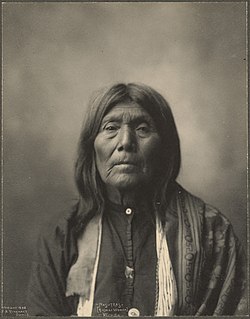Kichai people

Nasuteas (Kichai Woman), a Kichai that was part of the Wichita tribe, 1898
|
|
| Total population | |
|---|---|
| descendants are part of the Wichita and Affiliated Tribes | |
| Regions with significant populations | |
| United States (Louisiana, Oklahoma, Texas) | |
| Languages | |
| Caddoan language | |
| Religion | |
| traditional tribal religion, Christianity | |
| Related ethnic groups | |
| Arikara, Caddo, Hidatsa, Mandan, Pawnee, Tawakoni, Waco, Wichita people |
The Kichai tribe (also Keechi or Kitsai) was a Native American Southern Plains tribe that lived in Texas,Louisiana, and Oklahoma. Their name for themselves was K'itaish.
The Kichai were most closely related to the Pawnee. French explorers encountered them on the Red River in Louisiana in 1701. By the 1830s and 1840s, they lived in Southern and Southwestern Oklahoma with the Wichita and in the Muscogee Creek Nation.
The Kichai were part of the complex, shifting political alliances of the South Plains. Early Europeans identified them as enemies of the Caddo. In 1712, they fought the Hainai along the Trinity River; however, they were allied with other member tribe of the Caddoan Confederacy and intermarried with the Kadohadacho during this time.
By 1772, they primarily settled east of the Trinity River, near present-day Palestine, Texas.
On November 10, 1837, the Texas Rangers fought the Kichai in the Battle of Stone Houses. The Kichai were victorious, despite losing their leader in the first attack.
Caddo-Wichita-Delaware lands were broken up to individual allotments in the beginning of the 20th century. Kichai people's allotted lands were mainly in Caddo County, Oklahoma. Forty-seven fullblood Kichai lived in Oklahoma in 1950. There were only four at the end of the 20th century.
The Kichai are not a distinct federally recognized tribe, but they are instead enrolled in the Caddo Nation of Oklahoma and Wichita and Affiliated Tribes, to which they are related, as well as the Delaware Nation. These tribes live mostly in Southwestern Oklahoma, particularly in Caddo County, to which they were forcibly relocated by the United States Government in the 19th century.
...
Wikipedia
